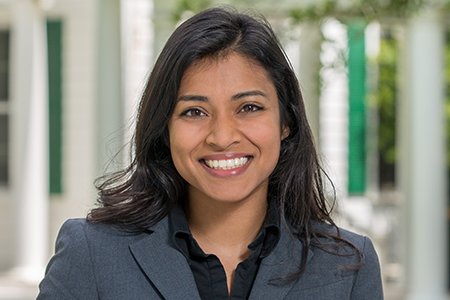Q&A with Professor Elissa Philip Gentry

What made you decide to become a law professor?
Being in legal academia means that I not only get to teach, but I get to continually learn as well. I find pushing the frontier of current knowledge and getting the chance to pass new research on to students particularly gratifying.
Please explain your area of expertise and why you chose to specialize in that area.
My research focuses on the intersection of law and economics and health law. I study consumers’ and physicians’ risk perceptions, particularly toward pharmaceutical products and medical devices, with an eye toward evaluating the need for regulation. I am also interested in the process by which physicians learn about, and incorporate into their medical practice, new risks associated with treatments.
Learning how to understand and deal with risk is a fundamental human issue, made much more salient in the context of health care. There are many known irrational reactions to incomplete risk information, and regulation is sometimes necessary to correct existing misperceptions. Working in this area allows me to shed light on a question that is ultimately very practical and policy relevant.
What’s most exciting about your area of expertise?
The law and economics of health care grapples with a lot of real-life decisions we make daily: how to deal with medical uncertainty, how to balance health risks with the other needs in our life, how to forecast our future needs. The practicality of the subject matter means that I have the opportunity to suggest reforms that might have a concrete effect on quality of life, which is very exciting for me.
How do you bring your scholarship/research into the classroom?
I am an empiricist by training, so I enjoy supplementing discussions about a legal topic with current empirical evidence regarding the phenomenon. I think this not only gives students an idea of the practical importance of a topic but also of the validity of the assumptions underlying the law. Moreover, presenting the type of empirical evidence currently available highlights the remaining empirical questions that have yet to be answered (and, accordingly, the assumptions that are still untested).
Why did you want to join the FSU Law faculty?
Florida State University’s College of Law is known for its excellence, not only in teaching but in scholarship, so I was very grateful to be affiliated with such quality scholars. Moreover, Dean O’Hara O’Connor was the director of graduate studies at Vanderbilt University when I was completing my J.D./Ph.D. there, so the chance to work under her direction was a big draw.
If you weren’t teaching, what do you think you would be doing?
Ideally, solving crimes on a television show.
Who had the biggest influence on you? Why?
My parents brought our family to the United States when I was one year old. My father is a chemical engineer and my mom is a chemist, and they both instilled in their children a love of learning and intellectual curiosity. Without their sacrifices I would not be where I am today, and without their mentorship and care I would not be who I am today.
What do you like to do in your spare time?
I am partial to short-distance, slow-paced runs.
Can you tell us a little about your family?
My husband, Matthew Gentry, is a professor in the economics department at FSU. Prior to arriving at FSU, he was a tenured assistant professor at the London School of Economics, and I was completing a postdoctoral fellowship at the Institute for Advanced Study in Toulouse (IAST) in France. Both of our families live here in the South, so we are excited to be close to home.
Are you working on any projects related to COVID-19?
I am working on a preliminary project with W. Kip Viscusi (Distinguished Professor at Vanderbilt University) regarding occupational risk preferences of healthcare workers. The specific risk we are studying is exposure to a COVID-type infection. This project will shed light on wage compensating differentials demanded for this type of occupational risk. Moreover, the project will examine how workers respond to employer-offered protection/insurance schemes meant to reduce such risk. This is an extension of our work on occupational risk regulation and value of statistical life/injury. We are currently crafting the survey and intend to run it on Amazon Mechanical Turk participants working in healthcare.
Can you tell readers about your experience teaching remotely during the spring semester?
It has definitely been an adjustment, but it has been encouraging to see the willingness of both students and faculty to take this journey together.
How would you describe FSU Law students?
FSU Law students are extremely bright and motivated. I have been so impressed by the insightful questions they ask and the intellectual curiosity they bring to the classroom. They know what they want to accomplish and they proactively take steps to actualize their goals.
What has surprised you most about FSU Law so far?
I have been impressed by the strong sense of community within the school. I appreciate that students seem to look out for each other and are proud of the culture of respect and empathy they have cultivated. Especially in today’s world, I think this is a mark of character that transcends academics and produces responsible members of society.
As printed in the 2020 issue of Florida State Law magazine.

